|
|
|
Sort Order |
|
|
|
Items / Page
|
|
|
|
|
|
|
| Srl | Item |
| 1 |
ID:
143254
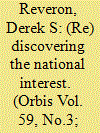

|
|
|
|
|
| Summary/Abstract |
There is an enduring consensus about America's role in the world, which is due to the fact that while administrations may change, fundamental U.S. interests have not. These include protecting the U.S. homeland from catastrophic attack, sustaining a global system marked by open lines of communication to facilitate commerce, and preserving regional balances of power. Far from being a reluctant imperialist or hegemon on the offensive, the United States tends to fill security voids when they are created (even if often late to the game) to ensure the international system remains functional. To be sure, future U.S. grand strategy will be global and multilateral, but it will be much more selective than it is today.
|
|
|
|
|
|
|
|
|
|
|
|
|
|
|
|
| 2 |
ID:
137507
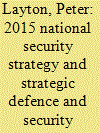

|
|
|
|
|
| Summary/Abstract |
In devising the 2015 National Security Strategy (NSS) and Strategic Defence and Security Review (SDSR), British decision-makers have a choice between trying to shape international affairs to be more favourable or instead planning to respond meaningfully to events that arise. The former grand strategic approach appears favoured however, the latter risk management approach remains the basis for work. That the two approaches are incompatible, distinctly dissimilar and would yield markedly different NSS and SDSR outcomes is generally overlooked. Moreover, opportunism, a third viable approach has been neglected. This article evaluates the three approaches, ascertains their principal advantages and weaknesses and outlines three alternative NSSs and SDSRs based on the different approaches.
|
|
|
|
|
|
|
|
|
|
|
|
|
|
|
|
| 3 |
ID:
056462
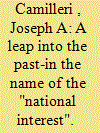

|
|
|
| 4 |
ID:
176919
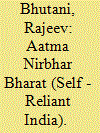

|
|
|
|
|
| Publication |
New Delhi, Pentagon Press, 2020.
|
| Description |
xvi, 198p.hbk
|
| Standard Number |
9789390095131
|
|
|
|
|
|
|
|
|
|
|
|
Copies: C:1/I:0,R:0,Q:0
Circulation
| Accession# | Call# | Current Location | Status | Policy | Location |
| 059970 | 338.54/BHU 059970 | Main | On Shelf | General | |
|
|
|
|
| 5 |
ID:
133755
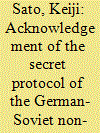

|
|
|
|
|
| Publication |
2014.
|
| Summary/Abstract |
In June 1989, the First Congress of People's Deputies of the Soviet Union established the Commission for Historical and Legal Estimation of the Soviet-German Non-aggression Pact of 1939. In the commission, representatives from Estonia, Latvia and Lithuania condemned the Soviet annexation of the Baltic States, prompting heated arguments regarding the invalidity of the related secret protocol of the pact with other members who continued to hold the traditional Soviet ideological view of the pact as something positive. The debate over the secret protocol had the further potential to extend to disputes over 'recovery of lost territory' amongst the Baltic States, Ukraine, Moldova, Belarus and Russia. This article analyses the arguments used by commission members, considering the interplay of national interests, how they balanced arguments between restoration of 'state sovereignty' and maintenance of borders, and how they finally compromised and concluded the commission's report.
|
|
|
|
|
|
|
|
|
|
|
|
|
|
|
|
| 6 |
ID:
124016
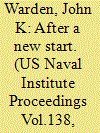

|
|
|
|
|
| Publication |
2012.
|
| Summary/Abstract |
While the United States has signed on to reduce its nuclear arsenal, the U.S. sea-based missile force remains crucial in a world where deterrence still matters.
|
|
|
|
|
|
|
|
|
|
|
|
|
|
|
|
| 7 |
ID:
128938
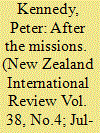

|
|
|
| 8 |
ID:
125091
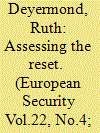

|
|
|
|
|
| Publication |
2013.
|
| Summary/Abstract |
Critics of the Obama administration's 'reset' with Russia claim that it has failed to improve bilateral relations and has conceded too much to Russia at the expense of American interests. In fact, the reset has delivered significant improvements in key areas and established the institutional basis for continued cooperation in the future, benefiting both states. Although disagreements remain on several important issues including missile defence, humanitarian intervention, and democracy, the reset has been broadly successful on its own terms, which were always limited in scope and based on a pragmatic recognition of the limits of possible cooperation. Future progress is uncertain, however - obstacles include differences of national interest; the complicating effects of relations with third party states and the impact of domestic politics. A continuation of the pragmatic approach underpinning the reset represents the best chance for stability in the US-Russia relationship.
|
|
|
|
|
|
|
|
|
|
|
|
|
|
|
|
| 9 |
ID:
124415
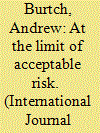

|
|
|
|
|
| Publication |
2013.
|
| Summary/Abstract |
Canada's first fighting season in Kandahar was traumatic. More than 40 soldiers were killed and several hundred injured. The unexpected strength of the insurgents' offensive was, in the Canadian experience, made worse by the extremely disappointing performance of the Afghan National Army and Afghan National Police. Improving the capabilities of the Afghan National Security Forces soon became an urgent concern and possible exit strategy. Part of Canada's answer was the Operational Mentor and Liaison Team (OMLT), which consisted of small groups of soldiers working side by side with Afghan forces to build their capability. This paper, based on interviews with former OMLT mentors, examines the origins and expansion of the Canadian OMLT, and offers an initial assessment of its impact.
|
|
|
|
|
|
|
|
|
|
|
|
|
|
|
|
| 10 |
ID:
125031
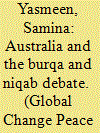

|
|
|
|
|
| Publication |
2013.
|
| Summary/Abstract |
This paper locates the discussion on wearing niqab and burqa within the context of information acquisition and response formation among Muslims and non-Muslims in the contemporary world. The paper argues that, against the backdrop of varied opinions on Islam and Muslims around the world, the debate on wearing burqa represents the continuation - albeit up-scaling - of the focus on Muslim women as the signifiers of Islam and Muslim identities. Australia is influenced by, and dealing with, the debate on whether or not to ban the burqa and niqab. Opinions among both the wider community and Muslims have differed on the justification and advisability of such a ban. The Australian government at the federal and state levels has demonstrated cautious activism in dealing with the issue, thus protecting the rights of Australian Muslim minorities, and reducing the space in which a heightened sense of exclusion could develop among them.
|
|
|
|
|
|
|
|
|
|
|
|
|
|
|
|
| 11 |
ID:
120151


|
|
|
|
|
| Publication |
2013.
|
| Summary/Abstract |
Why and how can historical cases support different assessments of China rising with respect to the possibility of its becoming China threat? Rationalists and strategic culture analysts, who predominantly look at China from an external position, debate the influence of power, strategic cultures, and identities in explaining this highly controversial question. We, however, develop an internal view from the standpoint of a China looking out, which argues that different sources of Chinese self-role concepts could yield different policy behaviour. We analyse two discourses on Chinese foreign policy that have emerged in the 21st century-core national interest and harmonious world. We then introduce the dialectic approach of harmonious realism wherein indecisiveness is the essential characteristic. It is failure to decide on the specific purpose of Chinese foreign policy that creates China's self-role conflict. Harmonious disciplining, balance, racism, and intervention are the practical forms of China's harmonious realism through which the contemporary case analysis explains the forms, actual policy, and behavioural consequences of China's self-role conflict.
|
|
|
|
|
|
|
|
|
|
|
|
|
|
|
|
| 12 |
ID:
091578
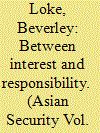

|
|
|
|
|
| Publication |
2009.
|
| Summary/Abstract |
This article is situated within the contemporary debates about the nature and purpose of China's growing power. It uses the concepts of "national interest" and "international responsibility" as a framework of analysis for Chinese foreign policy, and develops a three-dimensional typology to conceptualize their relationship (antagonistic; instrumental; mutually constitutive). This article adopts two main arguments. First, a stronger China is one gravitating toward greater notions of international responsibility, albeit instrumentally. Second, observable trends in China's evolving worldview indicate, however, that it is conceiving its national interests more broadly, embracing further socialization and greater normative commitments to international society. One may therefore view China's burgeoning global role as a great power with a degree of "cautious optimism."
|
|
|
|
|
|
|
|
|
|
|
|
|
|
|
|
| 13 |
ID:
131343
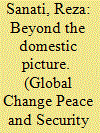

|
|
|
|
|
| Publication |
2014.
|
| Summary/Abstract |
This article examines the geopolitical determinants that have underpinned contemporary Iran-US relations, challenging the established thinking on why this relationship has been characterized by hostility. It is argued that the primacy that has been given to the role of domestic politics in either the US or Iran, as being the main arbiter of this relationship, is incomplete. This relationship is just as much a product of the structural conditions within the Middle East and the wider international system, which created the conditions for the clashing of the core national interests of both these states. However, due to the massive political and social alterations within the Middle East in the past decade, the notion of 'strategic irreconcilability' between both actors is now fundamentally changing. This has given room for a possible recalibration of the Iran-US relationship. Ultimately, it is argued that the synthesis of the domestic, the regional, and geopolitical levels of analysis are needed for a more holistic picture of the past, present, and future of Iran-US ties.
|
|
|
|
|
|
|
|
|
|
|
|
|
|
|
|
| 14 |
ID:
130105
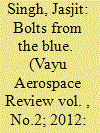

|
|
|
| 15 |
ID:
130926
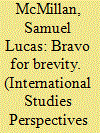

|
|
|
|
|
| Publication |
2014.
|
| Summary/Abstract |
This paper examines the use of short writing assignments in undergraduate international relations courses. It gives instructors ideas about thinking beyond traditional research papers and instead focuses on shorter assignments that demand critical thinking skills. The ability to write concisely is useful for students with future careers in government, business, nonprofits, journalism, electoral politics, or academia. By requiring application of theoretical frameworks (perhaps as policy recommendations in a memo), students can see how policymakers employ international relations theories, thereby simulating the work inside the National Security Council or US State Department. This highlights the connections between theory and policy. Short papers can also better showcase role playing and connect with active learning techniques. Research papers of 10 pages or more may not be as useful as shorter assignments that focus students' attention on analyzing an issue, presenting a case study, or writing a policy brief.
|
|
|
|
|
|
|
|
|
|
|
|
|
|
|
|
| 16 |
ID:
127592
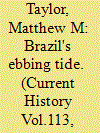

|
|
|
|
|
| Publication |
2014.
|
| Summary/Abstract |
Brazil is in a funk. The past year has brought violent protests, a new wave of corruption scandals, and wariness about the country's economic future. Former President Luiz Inácio Lula da Silva was known for his cheerful, tireless repetition of the message that "never before in the history of this country" had Brazil
accomplished so much. The contrast with his handpicked successor, Dilma Rousseff, was epitomized at the final match of the Confederations Cup, a major soccer tournament in June 2013, when Rousseff visibly stiffened as the crowd loudly booed her.
|
|
|
|
|
|
|
|
|
|
|
|
|
|
|
|
| 17 |
ID:
103090
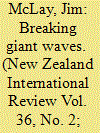

|
|
|
| 18 |
ID:
131435
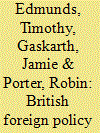

|
|
|
|
|
| Publication |
2014.
|
| Summary/Abstract |
In July 2013, Chatham House hosted a workshop under the auspices of the Global Insecurities Centre of the University of Bristol and the British Foreign Policy Working Group of the British International Studies Association, to explore these challenges. Four of the papers presented at that conference have been chosen for this special selection.
|
|
|
|
|
|
|
|
|
|
|
|
|
|
|
|
| 19 |
ID:
057647
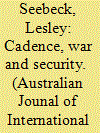

|
|
|
| 20 |
ID:
121222
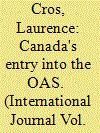

|
|
|
|
|
| Publication |
2012.
|
| Summary/Abstract |
Since the mid-1990s, identity has re-emerged as a key concept within
international relations theory. The social constructivist view of international
relations considers cultural variables, and particularly identity, as prime
agents in states' decision-making. For constructivists, identity is "the core
building block of interest, national or otherwise," and therefore they see
national identity and the national interests that derive from it as central in
state action1
. In the case of Canada, the concept of identity was, in the past,
central to the analysis of history.
|
|
|
|
|
|
|
|
|
|
|
|
|
|
|
|
|
|
|
|
|